|
GUERRILLAS & GORILLAS
A TOUR IN THE DEMOCRATIC REPUBLIC OF CONGO
by Lieutenant Colonel Guy Stone
Welsh Guards
|
Statistics illustrate the scale of the United Nations (UN) challenge in Democratic Republic of Congo (DRC). The nation borders nine countries, it is 2,344,858 square kilometres, and has a population of 82,243,000 (250 ethnic groups and over 200 local languages). Most significantly, there are more than 150 Armed Groups. With a new UN troop ceiling of 16,215, there is the equivalent of one soldier to every 144 square kilometres (one soldier in Bristol or eight in New York). The main issue here, and the principal concern, is human rights; the abuses, seldom reported by global media, and the on-going violence are a direct result of the political chaos, the population’s frustration and the UN’s limited ability to prevent such action.
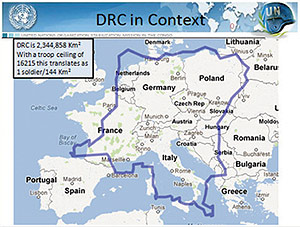 |
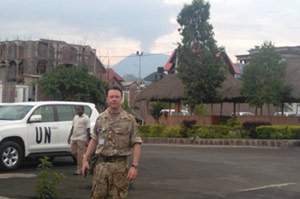 Outside the office with the volcano, Mount Nyiragongo, smouldering eerily in the distance.... Outside the office with the volcano, Mount Nyiragongo, smouldering eerily in the distance.... |
5.4 million are estimated to have died through fighting over the last two decades, corruption is rife, and DRC has one of the highest rates of sexual violence in the world, but DRC remains of most interest to the West due to its minerals: $24T of untapped resources. Until access to these critical materials (cobalt and copper) is cut off, the relevant legal and policy tools open to the West are unlikely to be used, leaving President Kabila, and any successor, to continue without facing consequences for the appalling situation in DRC.
After command, I was fortunate to be selected to deploy to the DRC as the Senior Military Advisor to Lt Gen Derrick Mgwebi, a South African special forces officer with forty years of soldiering and the Force Commander of MONUSCO, the UN mission in DRC. Aside from a ‘left form’, I struggled to imagine what I would be able to advise him on! MONUSCO is in DRC at the invitation of, but not in full partnership with, the Congolese Government. MONUSCO’s presence and engagement with the Government is perhaps the international community’s most valuable tool for checks and balances in DRC.
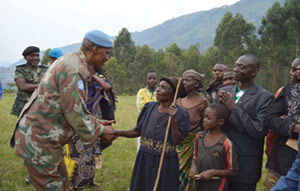
The Force Commander, Lt Gen Derrick Mgwebi (South Africa), reassuring Congolese in North Kivu
|
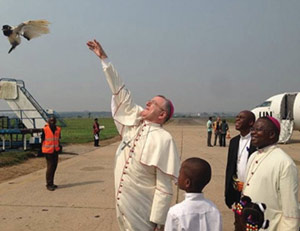
The apostolic nuncio, Monsignor Montemayor, releases a dove, in Kasais, the centre of atrocities
|
The UN Mission in DRC aims to protect civilians, support the implementation of the 31 December Agreement and electoral process, and neutralise Armed Groups, some of which, such as the Islamic Allied Democratic Forces (ADF), pose a significant threat. Elections are now planned for 23 December 2018, later than proposed, but this firm date provides a marker and some hope for the population. Without MONUSCO’s efforts to protect civilians, the path towards these elections would be more violent. Through its presence, political engagement, and human rights monitoring, MONUSCO plays a critical deterrent role. However, the UN’s effect is limited because of a lack of a clear UN vision; the unmanageable size of the country, Member States’ mission fatigue (the UN has been in DRC for 18 years); close political interest in value for money resulting in a reducing annual budget ($1.23B to $1.14B); a strained comprehensive approach, and some troops with poor leadership, questionable standards, notably regarding sexual exploitation, which many see as doing more harm than good.
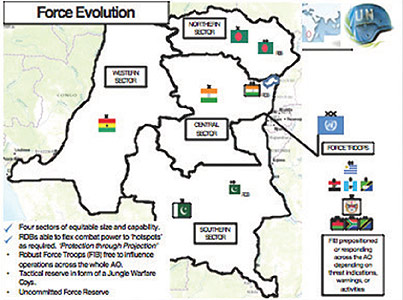
DRC is protected by UN troops from many nations, principally
Ghana, Bangladesh, India and Pakistan
|
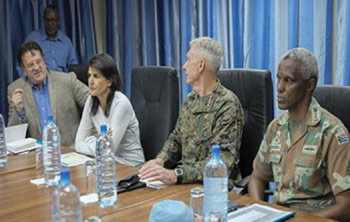
The Deputy Secretary General’s Special Representative MONUSCO (far left) and the Force Commander (far right) brief the US Ambassador to the UN, Nikki Haley and the US Commander Africa, Gen Waldhauser, October 2017
|
The UN’s effect is further hampered by weak government forces; there is no scope for a relationship such as the UK’s with the Afghan National Army during Operation HERRICK. The Congolese Army is underpaid (if at all), poorly equipped and led by some corrupt generals. In 2018, the Force HQ is due to move from Goma to the capital, Kinshasa, 1000 miles to the west and away from the ‘tactical fight’ in the East. This has been controversial, but it will allow the Force Commander to interact more effectively with the senior leadership of the Mission and the Congolese Government and military.
It is admirable, with such challenges, that MONUSCO has successes, seen recently in South Kivu. Congolese military failure against Armed Groups required UN interaction. The UN response was swift and coordinated; a microcosm of MONUSCO’s raison d’être in DRC. The principal impact of budget cuts has been the repatriation of troops and a necessary adaption of Force posture: ‘protection through projection’ as opposed to ‘protection through presence’. Uvira usefully illustrated this concept.
UK spends over £1M a day in DRC. With competing priorities, the MOD’s interest is understandably low, but our commitment, through five officers within the MONUSCO Force HQ, is highly valued by the UN. With the Canadians and French, our doctrine, experience and leadership, is frequently sought and applied which allows privileged and influential opportunities. However, this requires very careful diplomacy, an understanding of African culture (and how the British are often perceived), an acceptance of UN bureaucracy and not infrequent paralysis by process.
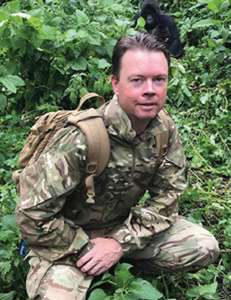 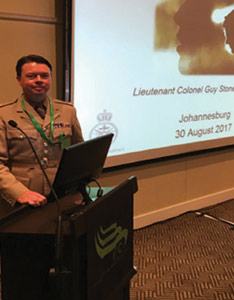
The author: with gorillas in Virunga and presenting in Johannesburg, August 2017
|
Due to the UK posts here, the MOD’s influence comes within Intelligence, ISR, Disarmament/Demobilisation & Reintegration, Gender & Child Protection, Plans and, until a recent switch of the Senior MA post to South Africa, the Force Commander’s outer office. The most significant impact made by the MOD in 2017 has been in Gender & Child Protection. The Gender Advisor (GENAD), a UK cavalry officer, has successfully implemented change, written policy, delivered tactical support on the ground and been invited to New York to speak, such is the high regard in which he is held. This is so positive for the UK, particularly as the issues with which the GENAD is involved are so topical and politically highly sensitive.
MONUSCO is serious and forward-leaning in its efforts to reform and implement its mandate in the most effective and efficient way, but there are hurdles. To achieve the intended outcomes, MONUSCO needs support from both UN Headquarters on issues ranging from Force Generation timelines, to administrative processes, to appropriate logistics support, and from Troop Contributing Countries on deploying well-trained troops with the right capabilities, equipment, discipline and mindset. The UN ‘keeps a lid’ on any over-spill of violence but is impotent at eradicating human rights abuses. The situation in DRC may improve after the 2018 elections; much hangs on the South African Development Community agenda and, unless the West’s access to critical minerals is cut off, US interest in DRC will remain limited.
DRC is a fascinating place for an operational tour. It provides an opportunity to serve in a highly complex operational environment, experience the dynamics of the UN first hand, and enjoy privileged influence in a 3-star military HQ where the UK military is leant upon for experience and knowledge. Household Division officers are encouraged to consider the opportunity should they wish to experience something different operationally, broaden their military portfolio for Defence Attachés appointments, or are considering a future in the UN and/or Africa. Competency in French is a distinct advantage combined with an understanding of the complexities of African culture and the on-going impact of colonialism.
|
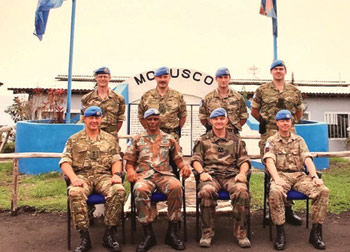
The British Contingent in DRC
Rear row: Lt Col Jeremy Mawdsley MBE RA, Maj Martyn Heenan RM, Maj Tim Graham SCOTS DG, Maj Paul Horne RA,
Front row: Lt Col Sean Grant RA, Force Commander (Lt Gen Derrick Mgwebi, RSA), Deputy Force Commander (Maj Gen Bernard Commins, France), Lt Col Guy Stone WG
|
|
|


 Outside the office with the volcano, Mount Nyiragongo, smouldering eerily in the distance....
Outside the office with the volcano, Mount Nyiragongo, smouldering eerily in the distance....





